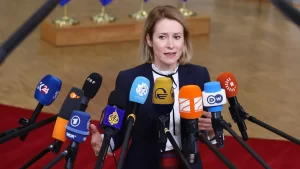No risk to Bulgaria’s security or energy supply despite Iran-Israel tensions

Sofia: Defense Minister Atanas Zapryanov and Energy Minister Zhecho Stankov moved to reassure the public on Monday, stating firmly that Bulgaria faces no direct threat – military or energy-related – following the escalation of hostilities between Israel and Iran. The ministers spoke after a special meeting convened by the Prime Minister and attended by top national security agencies and several key ministries.
Minister Zapryanov clarified that since the beginning of the Israel-Iran exchange of strikes, Bulgaria’s security services have been monitoring the situation around the clock. Following the recent U.S. airstrikes on Iranian nuclear sites, coordination between agencies intensified, and today’s working session aimed to evaluate any implications for Bulgaria’s national security and energy stability.
“There is no direct military threat to our country as a result of the U.S. strikes,” Zapryanov said. He confirmed that based on data from international monitoring bodies and neighboring states, there has been no change in the radiation background in Bulgaria. “There is no reason for concern regarding radiation levels,” he added.
The Minister also touched on NATO’s position, noting that any potential threat to Bulgaria would be considered a threat to the entire Alliance. “We expect NATO to activate its deterrence and defense strategies,” Zapryanov said. He added that Bulgaria’s armed forces remain on regular peacetime routines, with no need to alter their operational posture for now. A high-level NATO meeting in The Hague is scheduled for tomorrow, where further measures are likely to be discussed.
Meanwhile, Energy Minister Zhecho Stankov sought to counter fears of fuel shortages or price hikes stemming from the possibility of the Strait of Hormuz – through which a significant portion of the world’s oil passes – being closed by Iran. According to Stankov, Bulgaria’s energy market is well-insulated from such developments. “Even if the Strait is closed, this will not affect Bulgaria,” he said, pointing out that the country is not significantly reliant on crude oil shipments from the Gulf region.
He addressed recent claims from local associations suggesting that gas prices could rise to BGN 2.80 per liter if the strait were blocked. “I want to completely reject these forecasts,” Stankov said. “We do have a cargo shipment that transited the region, but it has already cleared the strait and is en route to the port of Burgas.”
Fuel reserves inside Bulgaria are sufficient, Stankov added, citing data from the Bulgarian Petroleum and Gas Association. “Diesel, gasoline, and propane-butane stocks are adequate to meet national demand. Citizens and businesses have no reason to worry.”
He also commented on the gas supply situation. Bulgaria currently receives one billion cubic meters of gas from Azerbaijan and has recently secured additional supplies via liquefied natural gas terminals. According to the Minister, these deliveries come at prices roughly 15% below average market rates.
On the subject of Bulgarian citizens in conflict zones, Zapryanov confirmed that those currently in Israel may return voluntarily as flights have resumed. Should the security situation deteriorate and civilian flights be suspended again, the government is prepared to organize an evacuation. When asked whether a similar plan was in place for Bulgarians in Iran, Zapryanov declined to respond.
Summing up, the two ministers were united in their message: Bulgaria remains safe from the direct fallout of the Middle East conflict, its energy markets are stable, and the government is prepared for all scenarios.





